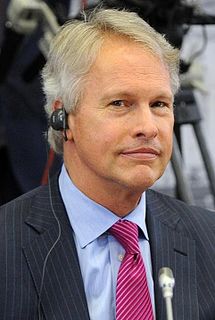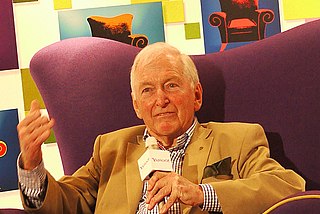A Quote by Eric Alterman
Trends in circulation and advertising - the rise of the Internet, which has made the daily newspaper look slow and unresponsive; the advent of Craigslist, which is wiping out classified advertising-have created a palpable sense of doom.
Related Quotes
Their constant yelping about a free press means, with a few honorable exceptions, freedom to peddle scandal, crime, sex, sensationalism, hate, innuendo and the political and financial uses of propaganda. A newspaper is a business out to make money through advertising revenue. That is predicated on the circulation and you know what circulation depends on.
Christmas was on a Sunday in 2005, which had a greater than expected negative impact on retail and classified advertising during the last weekend of our fiscal year. In addition, our California papers had held up well in automotive advertising, but the industry-wide decline in this category reached them in the fourth quarter as well.
Advertising seemed almost natural to me because it was a business where you had to inform, persuade and educate. And so from being a junior copywriter to being the creative director of one of the largest advertising agencies in the country took me 4.5 years, which is, well, a fairly spectacular rise.
In contemporary society, advertising is everywhere. We cannot walk down the street, shop, watch television, go through our mail, log on to the Internet, read a newspaper or take a train without encountering it. Whether we are alone, with our friends or family, or in a crowd, advertising is always with us, if only on the label of something we are using.
Of course, there is some truth in advertising. There's yeast in bread, but you can't make bread with yeast alone. Truth in advertising is like leaven, which a woman hid in three measures of meal. It provides a suitable quantity of gas, with which to blow out a mass of crude misrepresentation into a form that the public can swallow.
Lying and cheating in advertising, in the long run, are commercial suicide. Dishonesty in advertising destroys not only confidence in advertising, but also in the medium which carries the dishonest advertisement. . . . No one can be ill in a community without endangering others; no advertiser can be dishonest without casting suspicion upon others.
We tell the for-profit sector, 'Spend, spend, spend on advertising until the last dollar no longer produces a penny of value,' but we don't like to see our donations spent on advertising in charity. Our attitude is, 'Well look, if you can get the advertising donated (at four o'clock in the morning) I'm okay with that, but I don't want my donation spent on advertising, I want it to go to the needy,' as if the money invested in advertising could not bring in dramatically greater sums of money to serve the needy.
The counsel on public relations is not an advertising man but he advocates for advertising where that is indicated. Very often he is called in by an advertising agency to supplement its work on behalf of a client. His work and that of the advertising agency do not conflict with or duplicate each other.




































